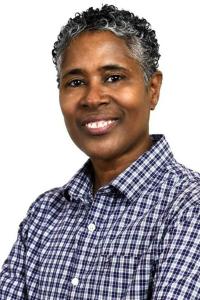Phoenix Matthews, PhD: The Power of Scholar-Activism
We are committed to the well-being and success of all community members. Columbia complies with all applicable civil rights laws and does not engage in illegal preferences or discrimination.
Phoenix Matthews, PhD, MS, BS, LCP, considers themself, first and foremost, a scholar-activist. The goal of scholar-activism is to leverage one’s academic role to advance social justice and racial equity. Instead of sitting isolated in an ivory tower, Dr. Matthews takes a boots-on-the-ground approach to their research, in order to serve those communities who need it most.
“For a long time, these two threads of what I was doing remained very separate,” says Dr. Matthews, who identifies as non-binary. “One part of me was studying psychology, learning about cancer prevention and control, and the other part of me was in the streets and working as an HIV/AIDS educator.”
Eventually, those once-separate identities merged during their time at the University of Illinois Chicago (UIC), an institution with a rich tradition of scholar-activism. There, Dr. Matthews engaged in both research and advocacy around the issue of menthol cigarettes, which are used most frequently by youth and African American smokers. After speaking at a series of town hall meetings, they helped pass Chicago’s first-ever restrictions on menthol-flavored tobacco sales.
In August 2022, Dr. Matthews joined Columbia University School of Nursing as a Professor of Behavioral Sciences. As a member of the Herbert Irving Comprehensive Cancer Center (HICCC) at New York-Presbyterian/Columbia University Irving Medical Center (CUIMC), they will examine determinants of cancer-related health disparities with a focus on racial/ethnic minorities and other underserved populations.
The Roots of Activism
After growing up in rural Appalachia, Dr. Matthews moved to Upstate New York in 1989 to complete a Ph.D. in clinical psychology at Binghamton University. Their time there coincided with the height of the AIDS epidemic, and they learned about activist-derived strategies for making efforts towards improving health in marginalized communities.
“That was probably one of the most influential aspects of my graduate training — this idea that information alone is not necessarily enough to be able to change hearts, minds, and policy,” says Dr. Matthews. “Often times, there's advocacy that needs to accompany that information.”
At UIC, they were able to combine their interest in addressing social injustices with their knowledge of research, regarding menthol cigarettes as well as gender-neutral restrooms. Their work also included development and evaluation of community-based and culturally targeted smoking cessation interventions; documenting differences in screening eligibility among African American smokers; and barriers related to breast, cervical, and colorectal cancer screening in African American and LGBTQ+ populations.
Next Steps
While at Columbia, Dr. Matthews aims to establish a more robust research portfolio in the area of lung cancer screening interventions. Alongside their work on smoking cessation, they want to develop strategies to increase community awareness and engagement around lung cancer screening, especially among high-risk populations such as African American men, older LGBTQ+ individuals, and HIV-positive individuals.
To support these efforts, the National Cancer Institute (NCI) recently awarded them funding to develop interventions for reducing cancer risk and improving cancer outcomes in areas of persistent poverty.
For Dr. Matthews, activism will always be at the forefront of their mind when thinking about research. They have witnessed firsthand the power of scholar-activism to make change and will continue to work with one foot in each world to help marginalized communities.
“I just think about each of us recognizing our privilege and utilizing it for the best possible good in whatever spaces that we occupy,” they say.
In 2015, Dr. Matthews was inducted into the Chicago LGBT Hall of Fame in recognition of their research and advocacy.


